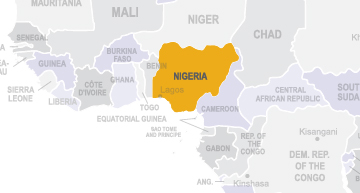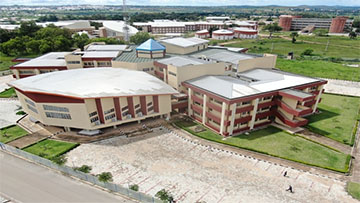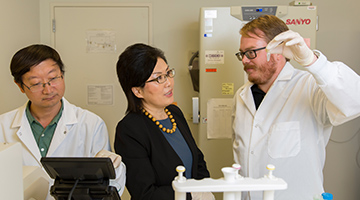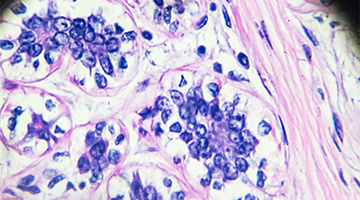Center for Global Oncology
The Center for Global Oncology is a joint center between the Robert H. Lurie Comprehensive Cancer Center of Northwestern University and the Robert J. Havey, MD Institute for Global Health.
Cancer kills more people in low- and middle-income countries than HIV/AIDS, tuberculosis and malaria combined. Worldwide, over 80 percent of cancer deaths occur in low- and middle-income countries, but only 5 percent of total global spending on cancer care is expended in these regions. Global oncology research is gaining significant importance at the national level as demonstrated by the establishment of the Center for Global Health at the NCI in 2011. Current national programs include those focused on Cancer Research and Networks, Cancer Control Planning and Capacity Building.
In this era of precision medicine, cutting-edge technologies in molecular and biological science have advanced our understanding of cancer etiology and development. The diverse genetic backgrounds, environmental exposures, socio-cultural practices and lifestyles represented by populations around the globe require us to collect scientific data from larger and more diverse groups of people to answer more specific questions about what causes cancer and how. In partnership with the Havey Institute for Global Health, we can develop more targeted tools to fulfill our shared mission of controlling cancer.
By collaborating with scientists around the world, we aim to detect cancers at their early stages, thus preventing and curing cancer not only in economically developed areas, but also in low- and middle-income countries. This is particularly important in vulnerable populations, such as those with chronic viral infections and those who are genetically susceptible to carcinogenic pollutants.”

Center Projects

Biomarkers of HIV-Associated Cancers - Nigeria
“Epigenomic Biomarkers of HIV-Associated Cancers in Nigeria - NCI Northwestern U54 Consortium”
Faculty: Northwestern co-PIs Robert Murphy, MD, and Lifang Hou, MD, PhD
Robert H. Lurie Comprehensive Cancer Center of Northwestern University was awarded this U54 grant from the NCI to establish a consortium, working in partnership with the University of Jos, University of Lagos and the Mayo Clinic School of Medicine. The joint U.S. and Nigerian consortium studies epigenetic signatures of the two most common HIV-associated cancers in Nigeria (liver and cervical cancer). The goal of this project is to improve our understanding of the role of HIV and other infections in cancer development. This will offer earlier diagnosis of premalignant and early-stage cancers and potentially lead to effective new strategies for cancer prevention, diagnosis and treatment. Our consortium also provides training for Nigerian scientists in molecular epidemiology. This study is sponsored by National Cancer Institute.
Northwestern & Nigeria Research Training Program in HIV & Malignancies
“Northwestern/Nigerian Research Training Program in HIV and Malignancies (NN-HAM) - NCI-FIC D43”
Faculty: Northwestern co-PIs Robert Murphy, MD, and Lifang Hou, MD, PhD
This project addresses a high priority NIH research area and significant problem in sub-Saharan Africa because of the widespread HIV epidemic made worse by the high burden of oncogenic viral co-infections. Through this project, investigators are building a multidisciplinary research training program at Jos University Teaching Hospital and Lagos University Teaching Hospital — some of the largest providers of HIV care in Africa — to build infrastructure and increase capacity for cancer epidemiology, biostatistics, biomedical informatics and translational and laboratory research on AIDS-defining malignancies here. This program is sponsored by National Cancer Institute and Fogarty International Center.

Research Training Program in HIV & Malignancies - Nigeria
“Northwestern and Jos University Research Training Program in HIV and Malignancies - NCI-FIC D43”
Faculty: Northwestern co-PIs Robert Murphy, MD, and Lifang Hou, MD, PhD
Through this project, investigators are building a multidisciplinary research training program at the University of Jos and Jos University Teaching Hospital — one of the largest providers of HIV care in Africa — to build infrastructure and increase capacity for cancer epidemiology, clinical trials and translational and laboratory research on AIDS-defining malignancies here. Our goal is to significantly reduce cancer incidence and its related morbidity and mortality. This program is sponsored by National Cancer Institute and Fogarty International Center.


